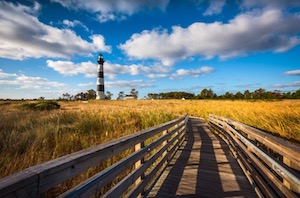Personal Injury Law in the Outer Banks of North Carolina: A Comprehensive Guide
Understanding Personal Injury Law in North Carolina

Personal injury law encompasses a wide range of legal matters pertaining to injuries caused by the negligence, recklessness, or intentional actions of others. In the Outer Banks of North Carolina, personal injury cases may arise from various incidents, such as automobile accidents, slip and fall accidents, drunk driving, motorcycle and trucking accidents.
North Carolina Negligence Laws
North Carolina follows the doctrine of contributory negligence, which means that if a plaintiff is found to be even partially responsible for their personal injuries, they may be barred from recovering any damages. This strict rule highlights the importance of retaining a skilled personal injury attorney to help navigate the complexities of North Carolina’s legal system.
Common Personal Injury Cases in the Outer Banks and Northeastern North Carolina
The Outer Banks, a popular vacation destination, is prone to specific types of personal injury cases. The following are some common scenarios:
Car Accidents
With an influx of tourists, car accidents are prevalent in the Outer Banks. Victims may suffer injuries ranging from minor cuts and bruises to severe, life-altering conditions. Seeking compensation for medical expenses, lost wages, and pain and suffering after a car accident is crucial for those affected.
Drunk Driving Accidents
Unfortunately, accidents involving alcohol are all too common in the Outer Banks. Victims of these accidents may be entitled compensation from both the driver and other parties responsible for serving drinks or allowing an intoxicated person to get behind the wheel.
Motorcycle Accidents
Motorcycle accidents are a common occurrence in the Outer Banks given the high rate of motorcycle riders. If a driver’s negligence caused your accident, you may be entitled to compensation.
Bicycle Accidents

Given the narrow winding roads in the Outer Banks, bicycle accidents may occur due to drivers not paying attention or going over the speed limit. Seeking compensation for medical expenses and pain and suffering is essential for cyclists injured in an accident caused by another person’s negligence.
Pedestrian Accidents
Pedestrians are at risk of being hit by cars or trucks on the roads in the Outer Banks. If a driver’s negligence caused your accident, you may be entitled to compensation for medical expenses, lost wages, and more.
Premises Liability
Property owners have a duty to maintain safe conditions for visitors. Slip and fall accidents, swimming pool accidents, and injuries caused by inadequate security can all fall under premises liability. Victims may be entitled to compensation in civil cases for their injuries if the property owner is found negligent.
Boating Accidents
Boating accidents are common on North Carolina’s Outer Banks due to the region’s popularity for water-based activities. Collisions, capsizing, and accidents involving inexperienced or intoxicated operators can lead to severe injuries, fatalities, and wrongful death claims. Maritime law governs these cases, and an attorney experienced in this field is essential for pursuing damages.
Tractor Trailers, Semi Truck, and 18-Wheeler Wrecks
Tractor trailers and large trucks are a common sight on the roads in the Outer Banks. Accidents involving these vehicles can be catastrophic due to their sheer size and weight. Victims may be entitled to recover compensation for medical expenses, lost wages, and other damages.
What to Do After a Personal Injury in the Outer Banks

Following a personal injury incident, there are crucial steps to take to protect your rights:
- Seek Medical Treatment: Obtain immediate medical care to document your injuries and receive appropriate treatment.
- Gather Evidence: Collect photographs, witness statements, and contact information of those involved in the incident.
- File a Police Report: Notify the police to create an official record of the accident.
- Contact a Personal Injury Lawyer: Reach out to an experienced attorney to discuss your case and determine your legal options.
- Recorded Statements: Do not give a statement to the insurance company and their adjuster, who are looking for a quick settlement.
- Releases: Do not sign a release or any type of waiver without first consulting with a lawyer. That includes Medical Authorizations and Release of Medical Records
Calculating Damages in Personal Injury Cases
In North Carolina, personal injury damages are typically divided into two categories:
Economic Damages
These include quantifiable financial losses, such as medical bills, lost wages, money damages, and property damage.
Non-Economic Damages
Non-economic damages compensate victims for intangible losses, such as pain and suffering, emotional distress, loss of consortium, and loss of enjoyment of life.
Statute of Limitations for Personal Injury Claims in North Carolina

North Carolina has a three-year statute of limitations for personal injury claims, meaning that victims have three years from the date of their injury to file a lawsuit. Failing to meet this deadline may result in the loss of the right to seek compensation.
Statute of Limitation for Wrongful Death Claims in North Carolina
The statute of limitations for wrongful death claims in North Carolina is two years from the date of death. After that period, survivors will be unable to bring a lawsuit to seek compensation for their losses.
Choose a Reputable Personal Injury Attorney in the Outer Banks
To protect your rights and help secure the compensation you deserve, it makes sense to establish an attorney-client relationship with a knowledgeable and experienced personal injury attorney. A skilled lawyer will guide you through the legal process, handle negotiations with insurance companies, and represent your best interests in court, if necessary. Choose a reputable law firm with a proven track record of success in the Outer Banks for your personal injury case.
How a Personal Injury Attorney Can Help Your Case
Retaining a dedicated personal injury attorney allows you to focus on your recovery. Here are some ways a lawyer can help:
Case Evaluation and Strategy
An experienced attorney will carefully evaluate your case, identifying potential pitfalls and determining the best strategy for pursuing compensation. They will consider the specifics of your situation and advise you on whether to proceed with negotiations, mediation, or litigation.
Investigation and Evidence Gathering
A thorough investigation is often an important aspect of building a strong personal injury claim. Your attorney will want to review police reports, medical records, and witness statements. They may also consult with experts in fields like accident reconstruction and medical professionals to strengthen your case.
Negotiating with Insurance Companies
Insurance companies often seek to minimize their financial exposure by offering lowball settlements or denying claims outright. A personal injury attorney will negotiate on your behalf, fighting for the compensation you deserve for your injuries.
Representation in Court
If a fair settlement cannot be reached through negotiations, your attorney must be prepared to represent your interests in court. The goal is to present a persuasive case, utilizing their knowledge of North Carolina’s personal injury laws and their experience with local courts and judges.
How to Choose the Right Personal Injury Attorney

Selecting the right attorney can be a critical aspect of a favorable recovery in your personal injury claim. Keep the following factors in mind when searching for a lawyer:
- Experience: Choose an attorney with extensive experience in handling personal injury cases, particularly those relevant to your specific situation.
- Track Record: Look for a law firm with a history of successful outcomes in personal injury cases, both in and out of the courtroom.
- Local Knowledge: A local attorney will have an in depth understanding of the local rules, procedures, and preferred court protocols specific to the Outer Banks and will be well-equipped to represent your interests.
- Communication: A strong attorney-client relationship is essential for a successful case. Choose an attorney who will keep you informed of the important stages of your case.
Understanding North Carolina’s Contributory Negligence Law
As mentioned earlier, North Carolina is one of the few states that follow the doctrine of contributory negligence. This legal principle can have a significant impact on your ability to recover damages in a personal injury case. Here’s what you need to know:
What is Contributory Negligence?
Contributory negligence is a legal doctrine that bars a plaintiff from recovering damages if they are found to have contributed to their own injuries in any way. This means that even if you were only 1% at fault for the incident, you may be ineligible for compensation.
Overcoming Contributory Negligence
Proving that you were not at fault for your injuries is essential in a contributory negligence state like North Carolina. An experienced personal injury attorney will work diligently to establish the other party’s negligence and minimize any potential fault on your part. This may involve gathering evidence, calling upon expert witnesses, and building a convincing legal argument in your favor.
Additional Resources for Personal Injury Victims in the Outer Banks

Here are some useful resources for personal injury victims in the Outer Banks:
- Motorcycle Accidents on the Outer Banks: Understanding the Unique Nature of Wrecks
- The Glover Law Firm: Your Guide to Wrongful Death Cases
- What you need to know about OBX Bicycle Accidents
- Helpful Information about Outer Banks Pedestrian Accident Claims
- How Long Do I Have to File a Claim?
- 7 Steps to Take After a Car Accident
- Motorcycle Accident FAQ
- Communities Served:
- Edenton, NC
- Elizabeth City, NC
- Hatteras, NC
- Kill Devil Hills, NC
- Kitty Hawk, NC
- Hertford, NC







